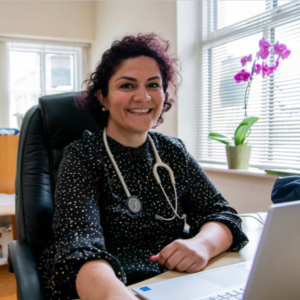Understanding Electrocardiogram (ECG)
My Health Assistant Ltd uses AI to help generate some of the health information on this website. This content is for general information only, is not medical advice and does not provide a diagnosis. Always speak to a qualified healthcare professional about your health concerns. In an emergency, call 999 or use NHS 111 in the UK. Please refer to the full, ‘My Health Assistant – AI & Medical Information Disclaimer.’
An Electrocardiogram (ECG or EKG) is a quick, painless test that records the electrical activity of your heart. It’s a crucial diagnostic tool used to detect abnormal heart rhythms, monitor existing heart conditions, and support early detection of cardiac issues. ECGs are often performed in hospitals, GP clinics, or specialised health centres.
What is an Electrocardiogram (ECG)?
An ECG measures the heart’s electrical signals using small electrode pads attached to the skin. It provides a graphical representation of how your heart beats, helping medical professionals identify conditions such as:
Arrhythmias (irregular heartbeat)
Coronary artery disease
Heart attacks (current or previous)
Heart enlargement or thickening
Electrolyte imbalances
There are several types of ECG, including resting ECGs, exercise (stress) ECGs, and 24-hour ambulatory ECGs (Holter monitoring).
What to Expect from an ECG
When attending an ECG appointment, here’s what you can expect:
Preparation: You may be asked to remove clothing above the waist and lie down.
Electrode Placement: Small adhesive electrodes are placed on your chest, arms, and legs.
Recording: A machine records your heart’s electrical signals, usually taking just a few minutes.
Review: Results are either analysed on the spot or reviewed by a cardiologist for follow-up.
The procedure is quick, painless, and does not involve any shocks or discomfort.
Who Conducts This Service?
An Electrocardiogram (ECG) is typically conducted by:
Trained healthcare assistants or technicians
Nurses
GPs or cardiologists in medical settings
Specialist heart screening clinics
In some cases, portable ECG monitors may be given for home use under supervision.
Who Might Need This Service?
You may need an ECG if you experience:
Chest pain or shortness of breath
Irregular or rapid heartbeat
Dizziness or fainting
Unexplained fatigue
A family history of heart disease
Pre-operative assessment for surgery
Ongoing cardiac condition monitoring
It is also routinely used for people aged 40+ as part of cardiovascular health screening.
Types of Electrocardiograms (ECG)
Depending on your symptoms and doctor’s recommendation, you may have:
Resting ECG: Carried out while you are lying down at rest.
Exercise ECG (Stress Test): Monitored during physical activity, usually on a treadmill or stationary bike.
Ambulatory ECG (Holter Monitor): Continuous recording over 24–48 hours while you go about daily life.
Event Monitor ECG: Used for longer-term monitoring triggered by symptoms.
Risks Associated with an ECG
An ECG is a completely safe and non-invasive test. Risks are minimal, but can occasionally include:
Mild skin irritation from the adhesive pads
Rare allergic reaction to electrodes
Misinterpretation if the test is not conducted correctly or results are not reviewed by a qualified professional
The test itself does not involve radiation or electric shocks.
How to Choose the Right Health Professional
When selecting an ECG service, consider:
Clinics with trained staff or cardiology consultants
Facilities that offer same-day or rapid-result services
Providers who explain the process clearly and handle follow-up care
Accredited clinics with modern equipment and good reviews
My Health Assistant can help you quickly find a reliable ECG service near me, with options suited to both private and NHS care.
Summary
An Electrocardiogram (ECG) is a critical tool for detecting and monitoring heart conditions. Whether you’re experiencing symptoms or undergoing routine heart screening, this simple, effective test can provide peace of mind and vital information. Use My Health Assistant to find a trustworthy ECG service near me and ensure your heart health is in safe hands.













